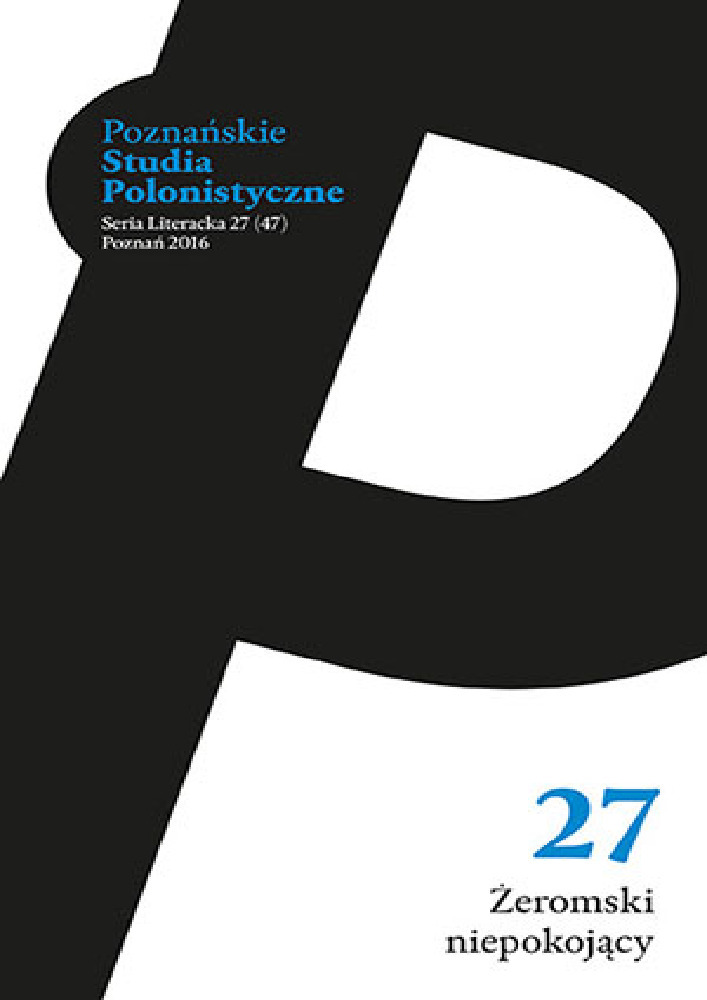Abstract
The articles presents an interpretation of selected topics from the Stefan Żeromski’s novel which form an articulation of the nineteenth century changes taking place within the metaphysics. The scene in which the protagonists from Żeromski’s novels experienced communication with the dead and lived through the inner enlightenment have been analyzed. The article also describes the poetics of articulation of metaphysical experience in the prose of Żeromski paying particular attention to the theme of light equivalentizing the internal initiation of heroes, leading them mainly to cross the barriers of death. From this perspective, the articles interprets such motives as birch, earth and kiss as functionalizing metaphysical experience of the heroes described in the novels. The analysis of these metaphysical enclaves in the prose of Żeromski allowed to put forward the thesis that the metaphysics of the writer is not inspired by philosophy or theology of the late nineteenth and early twentieth century, but by faith in the strength of family and native ties and by the power of human community which leads man into another dimension of reality.
References
Kalinowska Anna (2001), „Śmierć oswojona” i „śmierć dzika” w opowiadaniach W. Gomulickiego i S. Żeromskiego, w: Modernistyczny wizerunek człowieka. Studia historycznoliterackie, red. Janina Szcześniak, Dariusz Trześniowski, Wydawnictwo UMCS, Lublin, s. 21-32.
Kielak Dorota (2001), Wielka Wojna i świadomość przełomu. Literatura polska lat 1914-1918 wobec wyzwań czasu, Wydawnictwo UKSW, Warszawa.
Kopaliński Władysław (1990), Słownik symboli, Wiedza Powszechna, Warszawa.
Krąpiec Mieczysław A. (2006), Metafizyczne poznanie [hasło], w: Powszechna encyklopedia filozofii, t. 7, red. Andrzej Maryniarczyk i in., Polskie Towarzystwo Tomasza z Akwinu, Lublin, s. 90-101.
Kulczycka-Saloni Janina, Maciejewska Irena, Makowiecki Andrzej Zdzisław, Taborski Roman (1991), Młoda Polska, PWN, Warszawa.
Mazur Aneta (2001), Transcendencja realistów. Motywy metafizyczne w polskiej i niemieckiej prozie II połowy XIX wieku, Uniwersytet Opolski, Opole.
Obsulewicz Beata Katarzyna (2005), O idei miłosierdzia we wczesnej twórczości Stefana Żeromskiego, w: Światy Stefana Żeromskiego. Studia, red. Maria Jolanta Olszewska, Grzegorz Paweł Bąbiak, Wydział Polonistyki UW, Warszawa, s. 381-400.
Sikora Ireneusz (1992), Przyroda i wyobraźnia. O symbolice roślinnej w poezji Młodej Polski, Wydawnictwo Uniwersytetu Wrocławskiego, Wrocław.
Wojtatowicz Monika CSFN (2001), Biblia i człowiek w twórczości Stefana Żeromskiego, w: Wśród tułaczy i wędrowców. Studia młodopolskie, red. Stanisław Fita, Jakub A. Malik, Redakcja Wydawnictw KUL, Lublin, s. 53-98.
Zdanowicz Anna (2005), Metafizyka i życie społeczne. Stefan Żeromski wobec problemów współczesności, Biblioteka Narodowa, Warszawa.
Zielińska Marta (1994), Cmentarz [hasło], w: Słownik literatury polskiej XIX wieku, red. Józef Bachórz, Alina Kowalczykowa, Ossolineum, Wrocław, s. 136-139.
Żeromski Stefan (1964), Dzienniki, t. 2, oprac. i przedmowa Jerzy Kądziela, Czytelnik, Warszawa.
Żeromski Stefan (1966), Charitas, oprac. Stanisław Pigoń, Czytelnik, Warszawa.
Żeromski Stefan (1966), Zamieć, oprac. Stanisław Pigoń, Czytelnik, Warszawa.
Żeromski Stefan (1987), Ludzie bezdomni, oprac. Irena Maciejewska, Ossolineum, Wrocław.
Żeromski Stefan (1989), Uroda życia, wyd. 7, Dom Książki, Kielce.
License
Authors
Authors of texts accepted for publication in „Poznańskie Studia Polonistyczne. Seria Literacka” are required to complete, sign and return to the editor's office the Agreement for granting a royalty-free license to works with a commitment to grant a CC sub-license.
Under the agreement, the authors of texts published in „Poznańskie Studia Polonistyczne. Seria Literacka” grant the Adam Mickiewicz University in Poznań a non-exclusive, royalty-free license and authorize the use of Attribution-NoDerivatives 4.0 International (CC BY-ND 4.0)Creative Commons sub-license.
The authors retain the right to continue the free disposal of the work.
Users
Interested Internet users are entitled to use works published in „Poznańskie Studia Polonistyczne. Seria Literacka” since 2016, for non-commercial purposes only, under the following conditions:
- attribution - obligation to provide, together with the distributed work, information about the authorship, title, source (link to the original work, DOI) and the license itself.
- no derivatives - the work must be preserved in its original form, without the author's consent it is not possible to distribute the modified work, such as translations, publications, etc.
Copyrights are reserved for all texts published before 2016.
Miscellaneous
Adam Mickiewicz University in Poznań retains the right to magazines as a whole (layout, graphic form, title, cover design, logo etc.).
